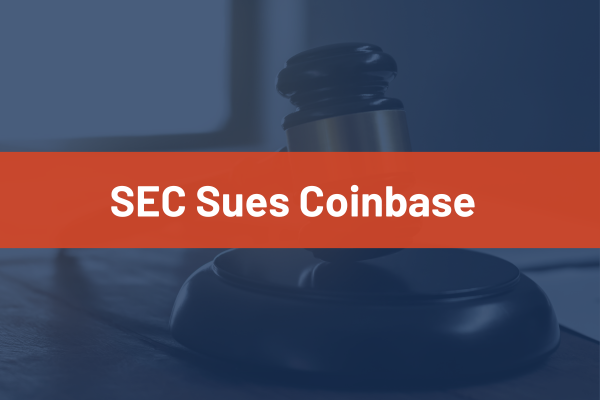In a recent press release, the Securities and Exchange Commission (SEC) announced its charges against Coinbase, Inc., a prominent crypto asset trading platform. The charges include operating as an unregistered national securities exchange, broker, and clearing agency, as well as conducting an unregistered offer and sale of securities through its staking-as-a-service program.
Let’s break down the allegations made by the SEC against Coinbase and the potential implications for the crypto exchange industry.
What Do the SEC’s Charges Against Coinbase Mean?
The lawsuit against Coinbase contains many similarities to the SEC’s lawsuit against Binance, the world’s largest cryptocurrency exchange, but does not include as many charges. Coinbase’s alleged violations include the following.
Unregistered Exchange, Broker, and Clearing Agency
The SEC alleges that since 2019, Coinbase has facilitated the buying and selling of crypto asset securities without proper registration. Coinbase is accused of merging the functions of an exchange, broker, and clearing agency, despite not fulfilling the legal requirement of registering these activities with the Commission. Specifically, Coinbase is alleged to have:
- Provided a marketplace that brings together multiple buyers and sellers of securities and facilitates their transactions through established methods.
- Engaged in securities transactions on behalf of its customers.
- Provided facilities for settling crypto asset securities transactions, acting as an intermediary and securities depository.
According to the SEC, by operating without registration, Coinbase has deprived investors of important safeguards and protections, including SEC inspection, recordkeeping requirements, and measures against conflicts of interest, among others. The complaint also asserts that Coinbase’s holding company, Coinbase Global Inc. (CGI), shares liability for certain violations committed by Coinbase.
Unregistered Offer and Sale of Securities in Connection with Staking-as-a-Service Program
The SEC further alleges that Coinbase conducted an unregistered securities offering through its staking-as-a-service program. This program allowed customers to earn profits from the “proof of stake” mechanisms of specific blockchains and Coinbase’s efforts. Coinbase pooled customers’ stakeable crypto assets, validated blockchain transactions, and distributed a portion of the rewards to participating customers. However, Coinbase failed to register these offers and sales as required by law.
What Are the Potential Consequences for Coinbase?
The charges brought by the SEC against Coinbase carry significant potential consequences for the crypto exchange platform. The SEC’s complaint seeks the following actions:
- Injunctive relief, which could result in Coinbase being ordered to cease its unregistered activities and comply with securities regulations moving forward.
- Disgorgement of ill-gotten gains, requiring Coinbase to surrender profits obtained through its alleged violations.
- SEC penalties may also be imposed, which could involve substantial monetary fines.
Background of the SEC’s Battle with Coinbase
This lawsuit is only the latest development in SEC’s ongoing battle with Coinbase. In July 2022, Coinbase submitted a petition to the SEC, requesting a clear regulatory framework for digital assets. When the SEC did not cooperate, Coinbase sued the SEC, seeking a formal response to said petition. Coinbase’s lawsuit against the SEC is limited in scope, but is an important of the larger battle for regulatory clarity in the cryptocurrency industry.
Impact of the SEC’s Coinbase Lawsuit on the Crypto Industry
The outcome of this lawsuit against Coinbase will undoubtedly have significant implications for the crypto exchange industry. It may shape regulatory enforcement actions in the future, leading to increased scrutiny of exchanges’ compliance with securities laws. For investors and stakeholders, it underscores the importance of working with SEC-compliant platforms to ensure adequate protections and adherence to regulatory standards.
Choose Regulatory Compliance with Gordon Law Group
The SEC’s charges against Coinbase highlight the necessity of regulatory compliance for crypto exchanges. At Gordon Law Group, we understand the complexities and evolving nature of SEC regulations. Our team of experienced attorneys practices SEC compliance for crypto exchanges, ensuring that your business operates within the bounds of the law while providing investors with the necessary protections.
Contact us today to learn how we can help your crypto exchange thrive in a compliant and secure manner.




